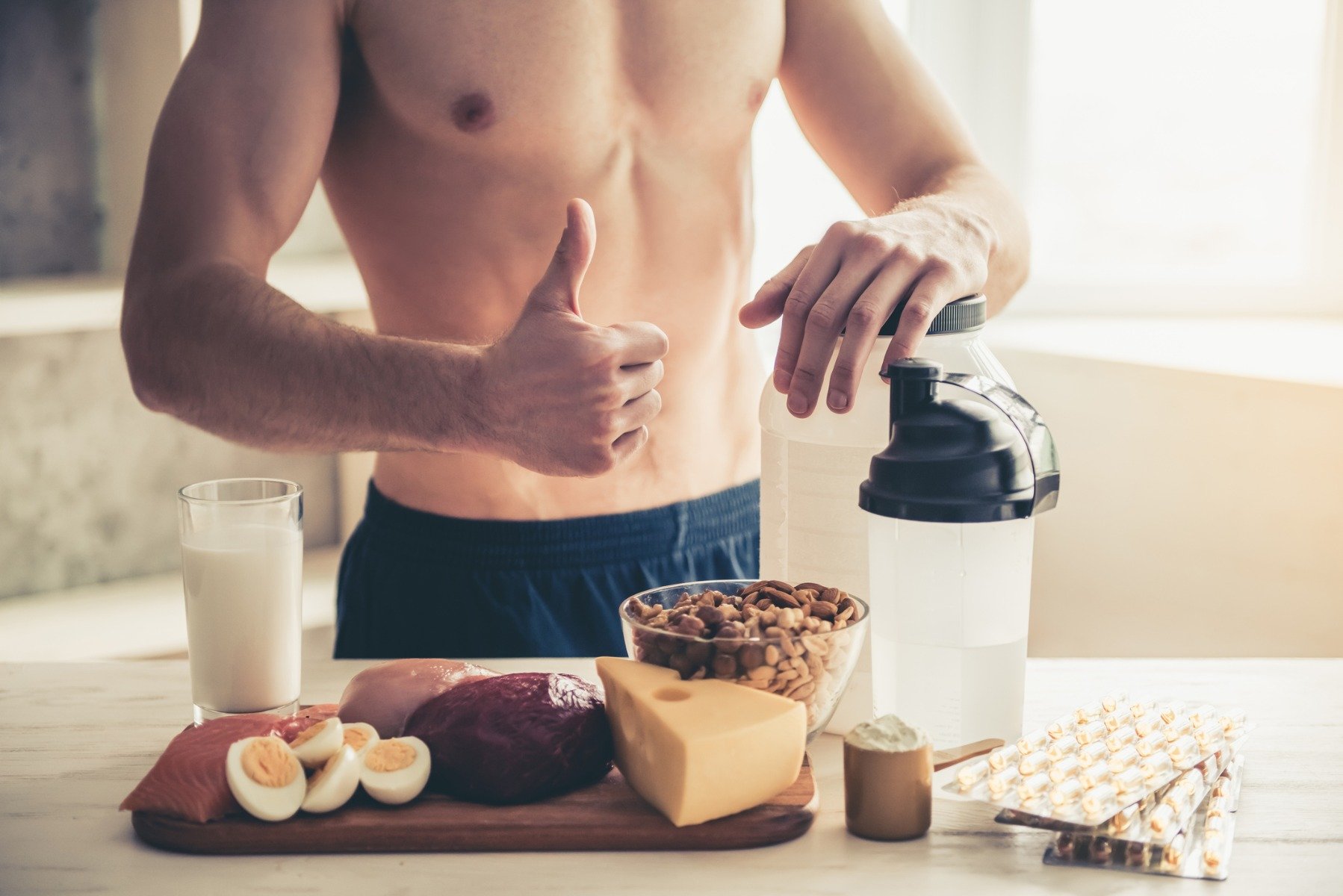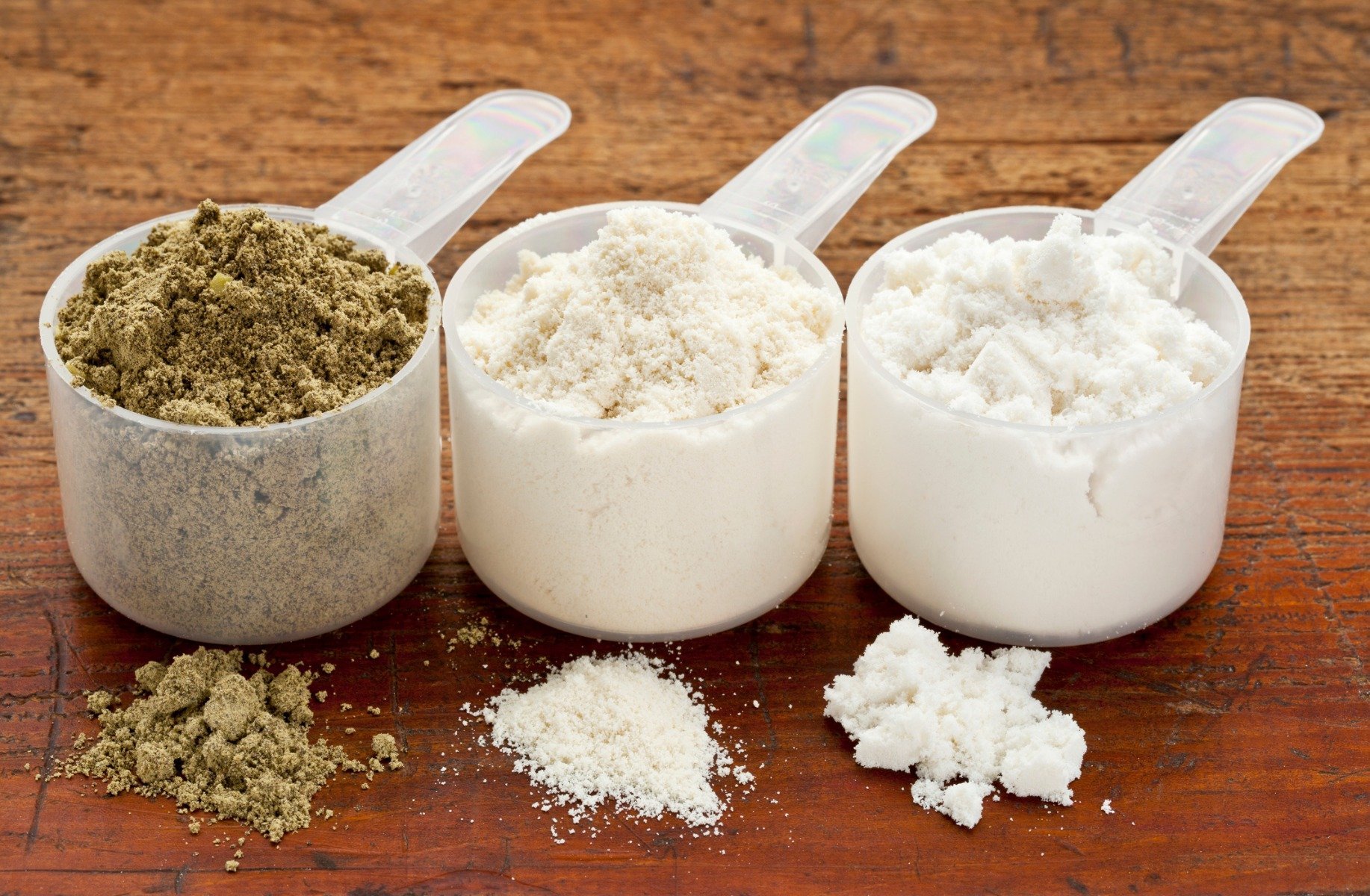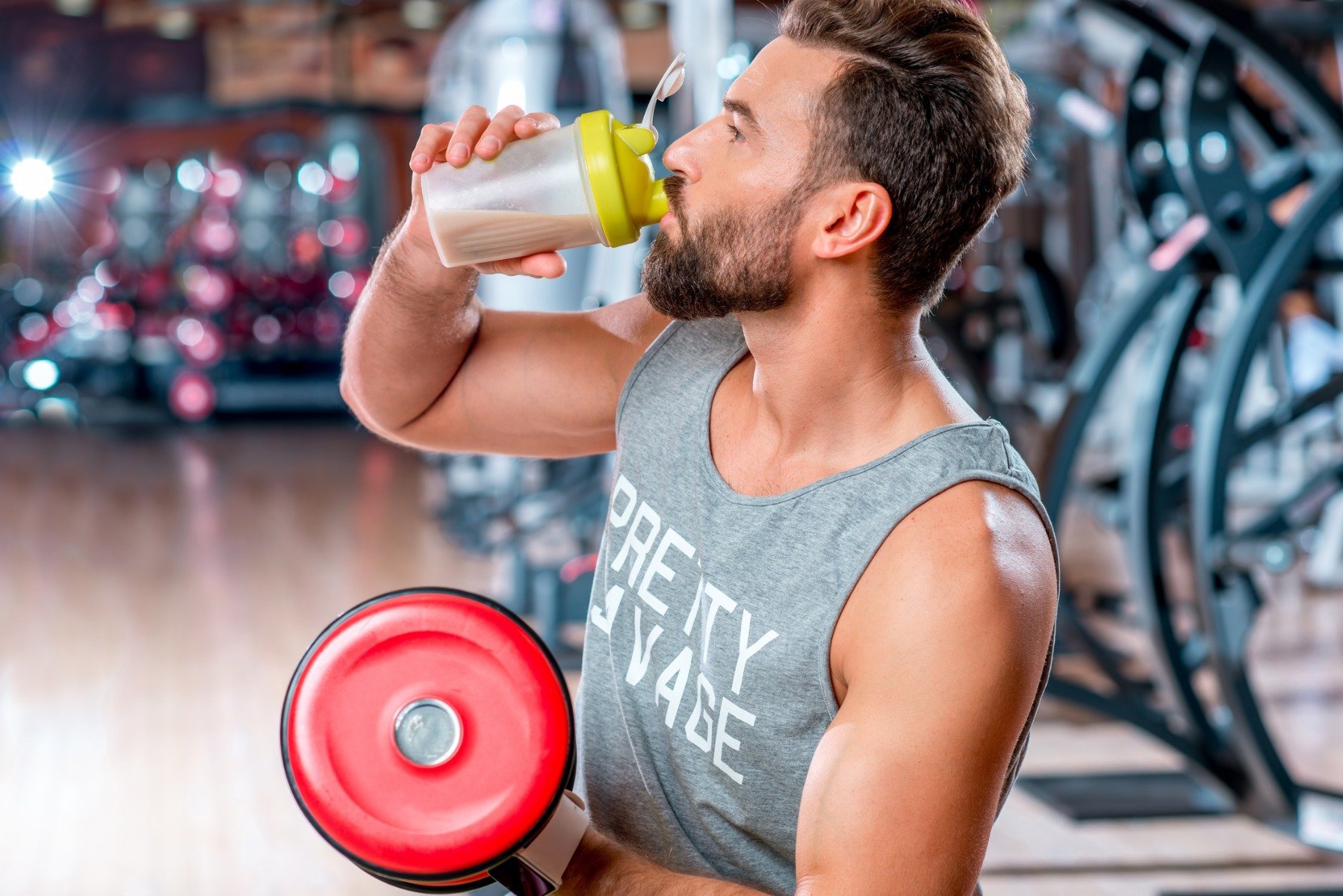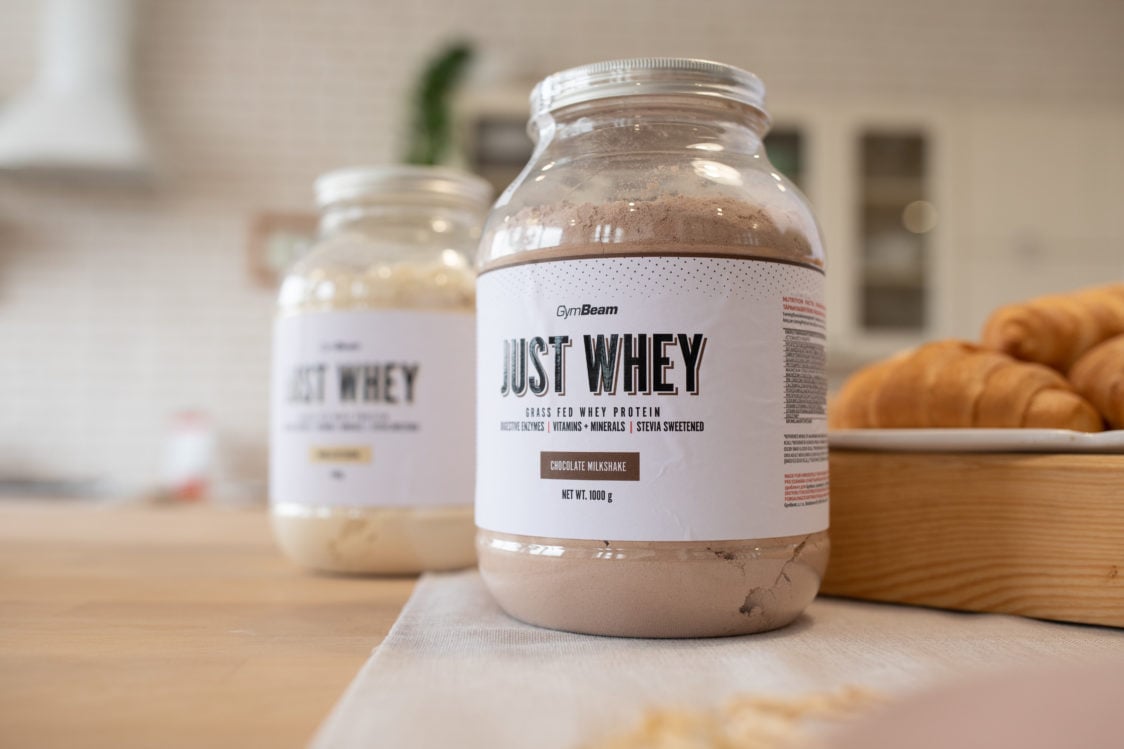Table of Contents
First, it is important to realise that proteins are foodstuffs. It is concerned with proteins which we receive from food or from the form of food supplements. If you are trying to build muscle mass, or the opposite, to reduce the weight, it cannot be done without proteins. Is the amount of received proteins and time when to enjoy it important?
Yes, it is. In the following lines, we will reveal to you how much protein you should receive and when. In the introduction you will know how many grams of protein is good to eat to achieve maximum results. Besides that, you will find out that proteins significantly contribute to the right body functioning and receiving of higher amount of protein is necessary for sportsmen. In the tables you will find out written amounts of protein you should receive according to the scientific studies.
In the part “when” you will read that timing of the amount of protein is not as important as receiving of protein regularly throughout the day. Of course, if you want to achieve results quickly and effectively, we are offering you several tips how to divide daily amount of protein into the individual parts of the day, in the morning, before training, after training, during the day and after sleep. Let’s get into it.

How much of protein is appropriate to receive on a daily basis?
Every cell in the human body contains proteins, that is why their sufficient daily amount is necessary for health. Besides positive impact on the growth of the muscles, it improves hormone production, boosts the immune system, encourages hair and nail growth. It doesn’t matter if you receive it from the animal sources, botanical or supplements, their optimal daily amount is dependent upon various factors. That is, age, weight, amount of physical activity and your goals – if you want to weight loss, or opposite, build muscle mass.
Minimum daily amount of protein
Daily amount of protein is stated in grams per kilogram of the weight g/kg, while minimum daily amount of protein begins with 0,8 g per kilogram of the weight [1]. For most people, the amount 0,8 g/kg is very low. Whether you are endurance runner or body-builder, minimum daily amount of protein is not enough for you. More intensively you work out, the higher requests of protein by your body.

You might be interested in these products:
Optimal daily amount of protein
Variety of studies examined receiving of proteins and their effects. The majority worked with 1,5g/kg of daily amount of protein. Only few researchers studied receiving of higher amount of protein around 2,2-3,3 g/kg. No research brought the evidence of negative impact of proteins on healthy people. [17] In the table attached, you will find basic division of daily receiving of proteins according to main factors. [10]
Healthy weight
| Lifestyle | Weight maintenance | Muscle growth | Fat reduction |
|---|---|---|---|
| Sitting type | 1,2–1,8 g/kg | 1,2–1,8 g/kg | 1,2–1,8 g/kg |
| Active type | 1,4–2,0 g/kg | 1,4–2,4 g/kg | 1,6–2,4 g/kg |
Overweight and obesity
| Lifestyle | Weight maintenance | Muscle growth | Fat reduction |
|---|---|---|---|
| Sitting type | 1,2–1,5 g/kg | inapplicable | 1,2–1,5 g/kg |
| Active type | 1,2–1,5 g/kg | 1,4–2 g/kg | 1,4–2 g/kg |

Optimal daily receive of proteins for the muscle growth
Combination of resistance training and the right amount of protein is the golden path to success. That is why we prepared table of ideal protein receive per day depending upon the body weight. It is the optimal amount to ensure the muscle growth, for women and for men.
| 45 kg | 63 g | 150 g |
| 57 kg | 80 g | 187 g |
| 68 kg | 95 g | 225 g |
| 79 kg | 111 g | 262 g |
| 91 kg | 127 g | 299 g |
| 102 kg | 143 g | 337 g |
| 113 kg | 158 g | 374 g |
| 125 kg | 175 g | 412 g |
Resulting from the table, sportsmen and active adults can minimize the growth of the fat of the body by increasing protein receive to the level 3,3 g per kilogram of the weight. [10] And therefore, healthy adult sportsman who wants to achieve the muscle growth and in reality he has 91 kg, can receive 299 grams of proteins on a daily basis.

Studies have shown that you overweight your body progressively by training and follow hypercaloric diet (370-800 kcal over), you will lose more fat when receiving proteins in the amount 3,3 g/kg than when consuming 1,8 – 2,6 g/kg of proteins. [18] [19] It is needed to mention that higher amount of protein won’t build more muscles than lower amount. It can help to minimize receiving of the fat from food, which in the time of volume diet you will consume more to gain mass. Remember that daily amount of protein should come from your body weight, not from the caloric receive. Caloric reception should be prepared on the basis of your weight and goals, that is why these amounts are interconnected.
Optimal daily amount of protein at the weight loss
One older study had shown that sportsmen should consume about 1,8 – 2,7 g/kg during diet. [20] Newer studies have shown that for the minimization of loss of muscle mass during dieting, the sportsmen should consume from 2,3 – 3,1 g/kg. [21] This higher amount was confirmed by International Society of Sports Nutrition. [22] The recommendation is applicable only to relatively slim people who are trying to form and strenghten the body. Several researches with obese people imply that the adequate amount for them is 1,2 -1,5 g/kg to minimalize the fat loss. [23] [24] [25] [31] This level is confirmed by European Association for the study of Obesity which reccomends 1,5 g/kg for obese adults. [26]

With regard to health problems associated with overweight and obesity, it is also interesting that consuming food with increased protein receive (about 27% of daily reception of calories) can lower the cardiometabolic risky factories, including blood pressure or the level of triglyceride. Plus it helps to increase needed HDL cholesterol. These effects were observed only in small amounts though. [27]
In the table you will find the overview of daily amount of protein for healthy adults, and for people with overweight. The amounts are divided according to body weight in kilograms. [10]
Overweight or obesity
| 45 kg | 54 g | 68 g |
| 57 kg | 68 g | 85 g |
| 68 kg | 82 g | 102 g |
| 79 kg | 95 g | 119 g |
| 91 kg | 109 g | 136 g |
| 102 kg | 122 g | 153 g |
| 113 kg | 136 g | 170 g |
| 125 kg | 150 g | 187 g |
Healthy weight
| 45 kg | 100 g | 150 g |
| 57 kg | 125 g | 187 g |
| 68 kg | 150 g | 225 g |
| 79 kg | 175 g | 262 g |
| 91 kg | 200 g | 299 g |
| 102 kg | 225 g | 337 g |
| 113 kg | 249 g | 374 g |
| 125 kg | 274 g | 412 g |
Remember that calculation of daily amount of protein comes from your real body weight, not from ideal weight which you want to achieve. In general, if you are on a diet to reduce the proportion of body fat or you sport and want to minimize reduction of fat and at the same time, you don’t want to lose muscle mass, you should receive 2,3 – 3,1 g/kg of protein on a daily basis. People with overweight or obesity should consume 1,2 – 1,5 g/kg of protein throughout the day. [10]

Can protein be harmful?
Maybe you have heard the myth that proteins harm the kidneys, cause liver failure or osteoporosis. The fact is that this claim wasn’t supported by any study, and evidence of the negative impacts of protein in the body of the healthy individuals doesn’t exist. [4] Of course, as long as you have health issues with kidney or liver, you should consult the consuming of protein supplements with your doctor.
Can the increased amount of protein receive harm your health?
The consuming of increased amount of protein can be accompanied by digestion problems such as flatulence or diarrhea. Also from this aspect it is needed to be consuming your optimal amount and divide it into smaller portions during the day.
How much of protein to receive in one portion after training?
Many studies dealt with the question how much of protein to receive in one portion. Three older studies agreed on the answer that 20 – 25 g of quality protein is enough for maximum stimulation of protein production in muscles. [12] [13] [14] However, newer study doubted this result. The argument is that previous studies didn’t take into account the amount of pure muscle mass. Therefore that human who has higher portion of pure muscle mass requires also higher portion of amino acids to maximize the growth and regeneration of muscles after training. Although, that wasn’t confirmed but the study came to the conclusion that synthesis of proteins in the muscles is higher after receiving of 40 grams of whey protein after training than after receiving 20 grams. [5]

In any case, there would be needed higher amount of studies under the same conditions for scientists to achieve knowledge about the most adequate amount of protein per one portion. Two studies which came with the result that 20-25 g is ideal portion for increasing of protein synthesis, made the research on group of people who exercised only legs. While the research which came with the result of ideal amount 40 g practised tests on the group of people who exercised the whole body. This can be another factor why these studies don’t agree one in another. Higher overall amount of activated muscles during training probably requires higher receiving of amino acids after training than muscles activated in legs only. [11]
There is a need to realise that muscle tissue spends about 25-30% of overall protein received. That means that consuming of higher amount of protein doesn’t have to necessarily support the muscle growth. If you receive 70 g of proteins in one portion, effects for the muscle growth can be the same as you received 40 g of proteins. [6] [15] Don’t worry, higher receive of proteins in one portion doesn’t mean that you waste the protein. The body preserves the proteins for later, for example as a source of energy for your next training. [9]
Everyone has the individual needs – age, weight, difficulty of training, fitness goals and level of difficulty of trainings. Whether your one-time amount will be 20 or 40 g, it is more important to receive the right amount of protein through the day and to split the protein receive throughout the day – at least into 5 parts. By this split you continually stimulate synthesis of proteins in the body. [8]
When is the most appropriate time to receive proteins?
The exact time isn’t as important as the right daily amount of protein. As mentioned, it is dependent upon your goals and actual body weight. The essential is to receive proteins regularly, during the whole day, in the amount of 20 – 40 g. Still, the most important is to follow the daily amount of protein receive and not number of portions. The effective solution is to combine the adequate protein and timing. This can be split into 5 phases – at the morning, during the day, in the evening, before training and after training.
1. At the morning
Studies have shown that body is the most sensitive to the effect of amino acids in protein 24 hours after training. [36] Quality quickly absorbable whey protein is the great start into the new day and also is an ideal breakfast for muscles with combination of food full of proteins such as scrambled eggs. If you want to replace breakfast with protein, choose gradually absorbable casein. [37]
2. During day
To get the required amount of protein, it is adequate to replace midmorning snack and afternoon snack for protein shake or protein bar or other snack. The supplement reserves of protein can be in the form of protein drink or natural sources of protein.
3. In the evening before sleep
Protein shake before sleep can be very effective when fat burning, and at the same when building the strength and muscles. In this case, the most adequate choice is casein, also called night protein that gradually absorbs and secures your muscles with continual reception of protein while you are sleeping. [33] [34] [35]

4. Protein before training
Protein drink before training has the same impact such as after training. [32] Quickly absorbable protein can help you to build muscle tissues during training. If you decide for protein before training, the ideal one is whey protein.
Not everyone can feel comfortable during the training with protein and for that, the most adequate alternative is consummation of essential amino acids BCAA (leucine, isoleucine,valine). Specific amino acid leucine is able to stimulate the cells responsible for the muscle growth. [2] Mostly when you are used to train on an empty stomach because at this time, your body is able to burn more proteins than to produce and it consequently leads to muscle mass loss. BCAA in soluble form needs to be received 15 minutes before training, in the form of capsules about 35 – 40 minutes before training.
5. Protein after training
Resistance training stimulates synthesis of muscles, and at the same time increases the risk of muscle apparatus injury. Consuming protein immediately after training can help you to maintain the balance between muscle damage and its growth. Specific amino acid leucine is able to stimulate the cells responsible for muscle growth. [2] This is why we recommend quickly absorbable whey protein after training. The exact time of how long after training it is adequate to drink protein is unknown. Analysis from the year 2013 came with the information about anabolic window which lasts 30 – 45 minutes after training. [16] Despite this, time 30 – 45 after training is adequate to supplement of proteins. If you miss it, don’t worry, you don’t lose the results. In any case, it is needed to receive amount of protein after training, by this you provide needed amino acids to your muscles for growth and regeneration. [28] [29] [30] [31] When choosing the adequate protein after training, think of that the speed of absorption of proteins is dependent upon the type of processing of the concrete protein.

Receiving of proteins within vegetarians and vegans
Vegetarians and vegans should be careful of how much protein and from which source they receive it. Only soya and quinoa contain all 9 essential amino acids which are necessary for the synthesis of proteins in the body. Remaining vegans and vegetarians sources of protein are not enough and this is why vegans and vegetarians proteins are frequently multicomponent so they could provide full amino acid profile. Daily amount of protein is between 1,5 – 2 g per kilogram on weight along with the amount of dry pulses and cereals which can secure the vegans and vegetarians needed proteins for building and regeneration of muscle tissue. [2]
Did you find out everything you needed to know about the amount of protein and its timing? Write down to comments what surprised you and what you had already known. If you like the article, support it by sharing.
[1] Sciences engineering medicine - Protein and Amino Acids – https://www.nap.edu/read/10490/chapter/1
[2] Krissy endall - ow much protein should you consume every day? – https://www.bodybuilding.com/content/how-much-protein-should-you-consume-every-day.html
[3] Bauer J, Biolo G, Cederholm T, Cesari M, ruz-Jentoft AJ, Morley JE, Philips S, Sieber C, Stehle P, Teta D, Visvanathan R, Volpi E, Boirie Y - Evidence-based recommendations for optimal dietary protein intake in older people: a position paper from the PROT-AGE Study Group. – https://www.ncbi.nlm.nih.gov/pubmed/23867520
[4] Anssi H Manninen - High-protein weight loss diets and purported adverse effects: Where is the evidence? – https://www.ncbi.nlm.nih.gov/pmc/articles/PMC2129142/
[5] Macnaughton LS, Wardle SL, Witard OC, McGlory C, Hamilton DL, Jeromson S, Lawrence CE, Wallis GA, Tipton KD - The response of muscle protein synthesis following whole-body resistance exercise is greater following 40 g than 20 g of ingested protein. – https://www.ncbi.nlm.nih.gov/pubmed/27511985
[6] Nair KS, Halliday D, Griggs RC - Leucine incorporation into mixed skeletal muscle protein in humans. – https://www.ncbi.nlm.nih.gov/pubmed/3279803
[7] Nicholas A. Burd, Stehphan van Vliet, Luc J.C. van Loon, Jospeh W. Beals, scott A. Paluska - Sustained Postprandial Muscle Protein Synthesis Rates after Protein Ingestion in Healthy Young Males – https://www.fasebj.org/doi/abs/10.1096/fasebj.31.1_supplement.652.2
[8] Mamerow MM, Mettler JA, English KL, Casperson SL, Arentson-Lantz E, Sheffield-Moore M, Layman DK, Paddon-Jones D - Dietary protein distribution positively influences 24-h muscle protein synthesis in healthy adults. – https://www.ncbi.nlm.nih.gov/pubmed/24477298
[9] Symons TB, Sheffield-Moore M, Wolfe RR, Paddon-Jones D - A moderate serving of high-quality protein maximally stimulates skeletal muscle protein synthesis in young and elderly subjects. https://www.ncbi.nlm.nih.gov/pubmed/19699838]
[10] How much protein do you need per day? – https://examine.com/nutrition/how-much-protein-do-you-need/
[11] How much protein do you need after exercise? – https://examine.com/nutrition/second-look-at-protein-quantity-after-exercise/
[12] Moore DR, Robinson MJ, Fry JL, Tang JE, Glover EI, WIlkinson SB, Prior T, Tarnopolsky MA, Phillips SM - Ingested protein dose response of muscle and albumin protein synthesis after resistance exercise in young men. – https://www.ncbi.nlm.nih.gov/pubmed/19056590?dopt=Citation
[13] Witard OC, Jackman SR, Breen L, Smith K, Selby A, Tipton KD - Myofibrillar muscle protein synthesis rates subsequent to a meal in response to increasing doses of whey protein at rest and after resistance exercise. – https://www.ncbi.nlm.nih.gov/pubmed/24257722
[14] Morton RW, McGlory C, Phillips SM - Nutritional interventions to augment resistance training-induced skeletal muscle hypertrophy. – https://www.ncbi.nlm.nih.gov/pubmed/26388782?dopt=Citation
[15] How much protein do you need after exercise? – https://examine.com/nutrition/second-look-at-protein-quantity-after-exercise/
[16] Brad Jon Schoenfeld, Alan Albert Aragon, James W. Krieger - The effect of protein timing on muscle strength and hypertrophy: a meta-analysis – https://jissn.biomedcentral.com/articles/10.1186/1550-2783-10-53
[17] Can eating too much protein be bad for you? – https://examine.com/nutrition/can-eating-too-much-protein-be-bad-for-you/
[18] Leaf A, Antonio J -The Effects of Overfeeding on Body Composition: The Role of Macronutrient Composition - A Narrative Review. – https://www.ncbi.nlm.nih.gov/pubmed/29399253
[19] Antonio J, Ellerbroek A? Silver T, Orris S, Scheiner M, Gonzalez A, Peacock CA - A high protein diet (3.4 g/kg/d) combined with a heavy resistance training program improves body composition in healthy trained men and women--a follow-up investigation. – https://www.ncbi.nlm.nih.gov/pubmed/26500462
[20] Phillips SM, Van Loon LJ - Dietary protein for athletes: from requirements to optimum adaptation. – https://www.ncbi.nlm.nih.gov/pubmed/22150425
[21] Helms ER, Zinn C, Rowlands DS, Brown SR - A systematic review of dietary protein during caloric restriction in resistance trained lean athletes: a case for higher intakes. – https://www.ncbi.nlm.nih.gov/pubmed/24092765
[22] Aragon AA, Schoenfield BJ, Wildman R, Kleiner S, VanDusseldorp T, Taylor L, Earnest CP, Arciero PJ, Wilborn C, Kalman DS, Stouz JR, Willoughby DS, Campbell B, Arent SM, Bannock L, Smith-Ryan AE, Antonio J - International society of sports nutrition position stand: diets and body composition. – https://www.ncbi.nlm.nih.gov/pubmed/28630601
[23] Kim JE, O Connor LE? Sands LP, Slebodnik MB, Campbell WW - Effects of dietary protein intake on body composition changes after weight loss in older adults: a systematic review and meta-analysis. – https://www.ncbi.nlm.nih.gov/pubmed/26883880
[24] Wycherley TP, Moran LJ, Clifton PM, Noakes M, Brinkworth GD - Effects of energy-restricted high-protein, low-fat compared with standard-protein, low-fat diets: a meta-analysis of randomized controlled trials. – https://www.ncbi.nlm.nih.gov/pubmed/23097268
[25] Krieger JW, Sitren HS, Daniels MJ, Langkamp-Henken B, - Effects of variation in protein and carbohydrate intake on body mass and composition during energy restriction: a meta-regression 1. – https://www.ncbi.nlm.nih.gov/pubmed/16469983
[26] Mathus-Vliegen EM - Prevalence, pathophysiology, health consequences and treatment options of obesity in the elderly: a guideline. – https://www.ncbi.nlm.nih.gov/pubmed/22797374
[27] Santesso N, Akl EA, Bianchi M, Mente A, Mustafa R, Heels-Andell D? Schunemann HJ - Effects of higher- versus lower-protein diets on health outcomes: a systematic review and meta-analysis. – https://www.ncbi.nlm.nih.gov/pubmed/22510792
[28] Bart Pennings, Rene Koopman, Milou Beelen, Joan MG Senden, Wim HM Saris, Luc JC van Loon - Exercising before protein intake allows for greater use of dietary protein–derived amino acids for de novo muscle protein synthesis in both young and elderly men – https://academic.oup.com/ajcn/article/93/2/322/4597647
[29] Tieland M, Dirks ML, van der Zwaluw N, Verdijk LB, van de Rest O, de Groot LC, van Loon LJ - Protein supplementation increases muscle mass gain during prolonged resistance-type exercise training in frail elderly people: a randomized, double-blind, placebo-controlled trial. – https://www.ncbi.nlm.nih.gov/pubmed/22770932
[30] Biolo G, Maggi SP, Williams BD, Tipton KD, Wolfe RR - Increased rates of muscle protein turnover and amino acid transport after resistance exercise in humans. – https://www.ncbi.nlm.nih.gov/pubmed/7900797
[31] S. M. Phillips, K. D. Tipton, A. Aarsland, S. E. Wolf, R. R. Wolfe - Mixed muscle protein synthesis and breakdown after resistance exercise in humans – https://www.physiology.org/doi/abs/10.1152/ajpendo.1997.273.1.e99
[32] The case for pre-workout protein – https://www.bodybuilding.com/content/the-case-for-pre-workout-protein.html
[33] Takudzwa A. Madzima, Lynn B. Panton, Sarah K. Fretti, Amber W. Kinsey - Night-time consumption of protein or carbohydrate results in increased morning resting energy expenditure in active college-aged men – https://www.cambridge.org/core/journals/british-journal-of-nutrition/article/night-time-consumption-of-protein-or-carbohydrate-results-in-increased-morning-resting-energy-expenditure-in-active-college-aged-men/941AC993B158DCCB3811954145378823
[34] Tim Snijders, Peter T Res, Joey SJ Smeets, Stephan van Vliet, Janneau van Kranenburg, Kamiel Maase, Arie K Kies, Le B Verdijk, Luc JC van Loon - Protein Ingestion before Sleep Increases Muscle Mass and Strength Gains during Prolonged Resistance-Type Exercise Training in Healthy Young Men – https://academic.oup.com/jn/article/145/6/1178/4644372
[35] Tim Snijders, Peter Res, Joey SJ Smeets, Stephan van Vliet, Janneau van Kranenburg, Kamiel Maase, Arie K Kies, Lex B Verijk, Luc JC van Loon - Protein Ingestion before Sleep Increases Muscle Mass and Strength Gains during Prolonged Resistance-Type Exercise Training in Healthy Young Men – https://academic.oup.com/jn/article/145/6/1178/4644372
[36] Burd NA, West DW, Moore DR, Atheton PJ, Staples AW, Prior T, Tang JE, REnnie MJ, Baker SK, Phillips SM - Enhanced amino acid sensitivity of myofibrillar protein synthesis persists for up to 24 h after resistance exercise in young men. – https://www.ncbi.nlm.nih.gov/pubmed/21289204
[37] Shawn LeBrun - The best time to take your supplements – https://www.bodybuilding.com/content/the-best-time-to-take-your-supplements.html
[38] Ralf Jäger et al. - International Society of Sports Nutrition Position Stand: protein and exercise – https://jissn.biomedcentral.com/articles/10.1186/s12970-017-0177-8
[39] Stefan M. Pasiakos et al. - Effects of high-protein diets on fat-free mass and muscle protein synthesis following weight loss: a randomized controlled trial – https://faseb.onlinelibrary.wiley.com/doi/pdf/10.1096/fj.13-230227

Add a comment